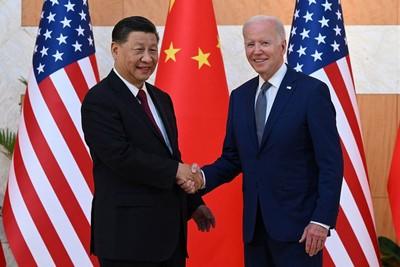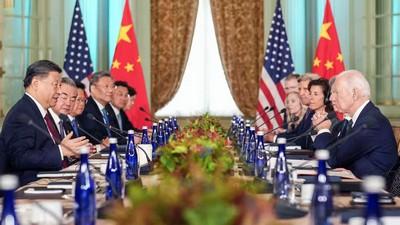
China-US strengthening dialogue and cooperation meets global expectations
Global Times
This Wednesday, Chinese President Xi Jinping sent a congratulatory letter to the 2024 Gala Dinner of the US-China Business Council (USCBC). The letter conveyed China’s sincere hope for long-term peaceful coexistence and greater dialogue and cooperation between our two countries, as well as its firm commitment to deepening reform comprehensively and opening up wider to the world. On the same day, US President Joe Biden also sent a congratulatory letter to the event. These simultaneous actions by the top leaders of both countries demonstrate that China and the US regard each other as significant economic and trade partners. Furthermore, representatives from the Chinese and US governments on Friday in Beijing extended the Agreement Between the US and China on Cooperation in Science and Technology for additional five years, effective from August 27, 2024, which is exciting news. As one of the world’s most significant bilateral relationships, the trajectory of China-US ties has profound implications not only for the two nations’ peoples but also for the future of humanity.

We have noticed there have been frequent high-level economic interactions between China and the US recently. On Wednesday, US Treasury Secretary Janet Yellen urged the next US administration to “maintain the dialogue channels” that she re-established with China. Meanwhile, China’s Ministry of Commerce spokesperson He Yadong confirmed on Thursday that the Chinese side has maintained close communication with the US Department of Commerce and is also open to contact and communication with the new administration’s economic and trade team. Following a meeting of the two countries’ economic working group at the G20 finance ministers’ meeting in South Africa on Thursday, a financial working group meeting is scheduled to take place in Nanjing from December 15 to 16. It is evident that the need for strengthened communication and expanded cooperation between China and the US in the economic and trade sectors has not diminished with changes in government, nor has it been shaken by the “anti-globalization” trend.
As an organization representing over 200 US member companies conducting business in China, the USCBC reflects a significant portion of US corporate interests. In July, its delegation was the first from the US business community to visit China after the third plenary session of the 20th Central Committee of the Communist Party of China. Last month, at the 7th China International Import Expo, USCBC President Craig Allen remarked, “China remains a very important market to the US.” This year, high-ranking executives from leading companies such as Apple, Boeing, and Goldman Sachs have visited China to participate in exhibitions, attend conferences, and explore business opportunities. Clearly, US businesses still view their operations in China as a priority, recognizing the strong resilience and vitality of the Chinese economy and hoping to share in the vast opportunities it offers.
As the world’s two largest economies, China and the US have highly complementary and resilient economic and trade relations. “Making the pie of cooperation bigger” is the best choice for both sides. China has a robust manufacturing sector and is advancing toward higher-end, smarter, and greener development, serving as a critical link in the global production and supply chain. The recently concluded Central Economic Work Conference reaffirmed that the Chinese economy has posted a generally stable performance while making progress and outlined policies for next year to “comprehensively deepen reform, and expand high-standard opening-up,” injecting certainty and momentum into the global economy. The US, meanwhile, also has a vast market, world-class research capabilities, innovation capacity, and rich talent resources. If the two countries leverage their respective development strengths and resource endowments to collaborate, the result will undoubtedly be greater than the sum of its parts, achieving the “1+1>2” effect that benefits both nations and contributes to shared prosperity worldwide.
For some time now, Washington’s approach to China has exhibited a contrast between the competition in high-profile rhetoric in public discourse and closer cooperation in practice. A compelling example is that despite US efforts of “de-risking” through tariff wars, trade wars, and technology restrictions, the total trade value between China and the US rose to 4.44 trillion yuan in the first 11 months of this year, a year-on-year increase of 4.2 percent. When factoring in “indirect trade” through third-party markets like ASEAN countries and Mexico, economic exchanges between the two nations have only grown rather than diminished. The hawkish stance in Washington is increasingly out of sync with the steady progress of China-US economic relations. The recently passed National Defense Authorization Act (NDAA) for Fiscal Year 2025 by the US House of Representatives continues to cite the “China threat” as a pretext for imposing numerous restrictions on China, including a bizarre provision banning the sale of “Chinese garlic” in US military stores. However, the act notably excludes areas such as cross-border e-commerce, biopharmaceuticals, and investments in China – fields in which US interests are significantly involved. The facts prove that the economic interests of China and the US are deeply intertwined, which is the fundamental logic behind why the two countries should not, and cannot, become “parallel worlds.”
For China and the US to strengthen dialogue and cooperation is not only in the fundamental interests of both nations and their peoples but also aligns with the widespread expectations of the world. The way these two large countries interact will, to a large extent, determine whether the world leans toward unity or division, whether global supply chains follow a “globalized arrangement” or a “bloc-based arrangement,” and whether the pace of human productivity growth and civilizational progress will accelerate or slow down.
As the Chinese saying goes, “A new year brings new beginnings.” It is hoped that in the coming year, China-US relations can start on a positive note from a new starting point.
